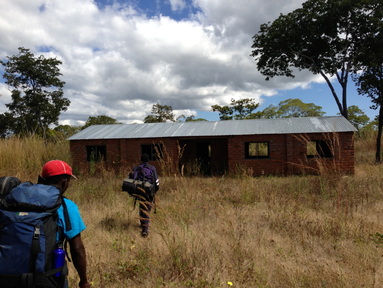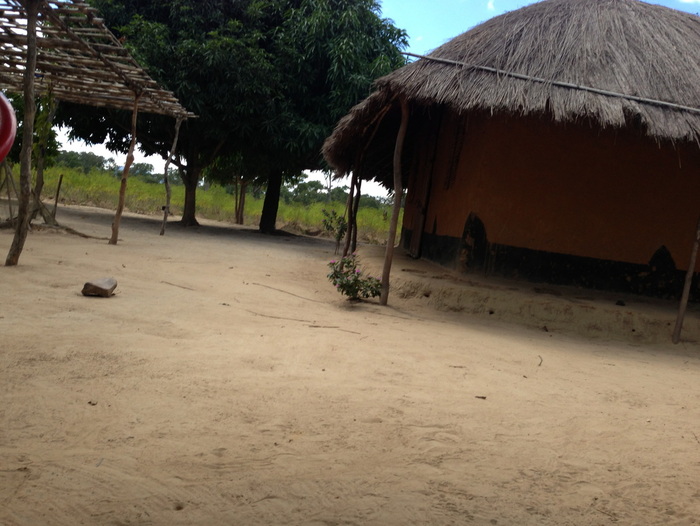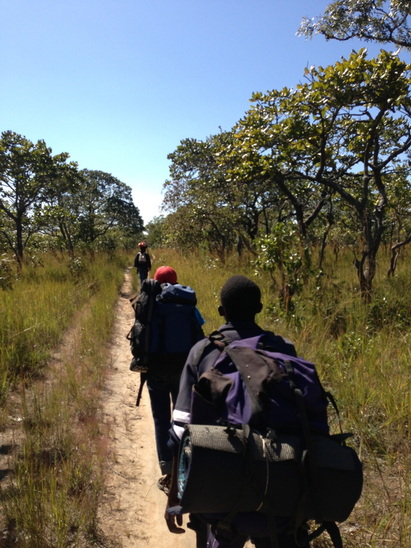 The overgrown school of Matepwe
The overgrown school of Matepwe SURPRISE!! As I had predicted might happen, I am back early from this most recent trip - but trust me, not without stories to tell! But all in good time... I will continue where I left off.
JUNE 13: Because of the forgotten tent, Mssrs. Joe and Marcos have been staying in the front room of the nduna’s house while in Mcondece, and I have been in the tent in the front yard. I am never concerned about my possessions when camped in places like this; nobody would ever dare touch anything on the property of an mfumu or nduna.
After breakfast and what seemed like an amicable meeting with the choir committee (though not all their problems were solved), we began the hike at 8:30. It is part of local custom for members of the host family or community to carry at least some of a visitor’s burden part of the way as they leave. Here, people from the village carried our packs for the first hour and a half of our journey this time! The weather was warm but pleasant and dry, this being an intermountain climate. I was really enjoying this hike on the flat path, which made it easy for me to take everything in without being overly concerned about watching my step.
We reached Matepwe before noon. I would estimate about one-third of the houses were deserted, but there were plenty of people around – nothing like the “abandoned village” we were told we would find. We took a small detour to the school and found it unused, with weeds growing all the way up to the schoolhouse. When Joe saw this, he wanted to find the chief to ask him if maybe the Trust could take the iron roof to distribute to other villages who needed roofing materials. His concern was that if the roof was not removed soon, a brush fire could happen any time in all the dry weeds. This would melt the roof and render it unusable. By the sort of coincidence one comes almost to expect here, a young man in his teens or early twenties was ahead of us on the path. He told Joe he knew where the chief was and would take us to him.
JUNE 13: Because of the forgotten tent, Mssrs. Joe and Marcos have been staying in the front room of the nduna’s house while in Mcondece, and I have been in the tent in the front yard. I am never concerned about my possessions when camped in places like this; nobody would ever dare touch anything on the property of an mfumu or nduna.
After breakfast and what seemed like an amicable meeting with the choir committee (though not all their problems were solved), we began the hike at 8:30. It is part of local custom for members of the host family or community to carry at least some of a visitor’s burden part of the way as they leave. Here, people from the village carried our packs for the first hour and a half of our journey this time! The weather was warm but pleasant and dry, this being an intermountain climate. I was really enjoying this hike on the flat path, which made it easy for me to take everything in without being overly concerned about watching my step.
We reached Matepwe before noon. I would estimate about one-third of the houses were deserted, but there were plenty of people around – nothing like the “abandoned village” we were told we would find. We took a small detour to the school and found it unused, with weeds growing all the way up to the schoolhouse. When Joe saw this, he wanted to find the chief to ask him if maybe the Trust could take the iron roof to distribute to other villages who needed roofing materials. His concern was that if the roof was not removed soon, a brush fire could happen any time in all the dry weeds. This would melt the roof and render it unusable. By the sort of coincidence one comes almost to expect here, a young man in his teens or early twenties was ahead of us on the path. He told Joe he knew where the chief was and would take us to him.
 A slanted view of the mfumu of Matepwe's home (taken on the go). Note the pergola to the left and the geometrically decorated home on the right.
A slanted view of the mfumu of Matepwe's home (taken on the go). Note the pergola to the left and the geometrically decorated home on the right. The chief was working in one of his fields. To get to this field, we had to walk down an incredibly impressive avenue of sorts – a path of banana trees that stretched in a line for about a quarter of a mile or more. On the left side, the trees then gave way to a huge sugar cane field, while the banana trees on the right continued to a marshy river. This must have been the same marshy river in which I had gotten a boot wet earlier in the day when trying to jump over it. I was happy to give my boot a chance to dry out while the chief and Joe talked.
Apparently the village is not abandoned, although most of the Yao people in the village had left. This would be another topic for a blog post, but history in this region has caused the Yao and Nyanja to ebb and flow in their population and amount of space they occupy. Also for reasons of history, the Yao have their own language and are Muslim, although their practice of that faith is considered “folk Islam” because it blends elements of their former traditional beliefs. In this region, if the majority in a village is Nyanja, then Nyanja laws are observed and the chief is Nyanja. The reverse is true if a village is majority Yao. From time to time, one group or the other may simply pull up and relocate. That seems to be what happened here. The reason might have been concern over the elephant damage in Mcondece or not. The chief said there was no such damage in Matepwe, so that seemed unlikely. Nobody really seemed to know the reason.
The reason the school was closed was a very different reason than we had been given. In another village on a previous trip, we had met a teacher who had been at Matepwe. It was he who had told us that the village was nearly abandoned. Now we learned from the chief that what had actually happened was that this very teacher had been caught in flagrante delicto by a villager when he walked into his hut and found this teacher and his own wife in bed together. After personal forms of justice had been meted out (I didn’t want to hear the gory details, since I have heard what is done in other such cases), the school committee then voted to impose a substantial fine. Recognizing his future career in Matepwe would be a bit –shall we say - compromised, the teacher requested a transfer, which was granted. The other teacher saw a future of months living as the teacher in Mcondece was currently living, teaching all the children in all grades. Deciding this would be too much to bear, he simply left. Thus, no school. Some families relocated when school closed, and of the remaining families, none wished to be in the choir. Thus, no choir.
The hope, the mfumu told us, was to begin school again in January with the start of the new school year, and the chief was working to get two teachers in place. He produced a list of school-aged children in Matepwe: there were 187 names on the list. The school stays! Joe told him of the overgrown weeds and asked if a committee could be formed to clear them before the roof was destroyed. The chief said he would indeed take care of it.
As we were leaving, the mfumu had the young man we met on the path go into the sugar cane field. He cut nine giant canes for us to take along with us. He then carried one of our bags as we resumed the hike. As he left to continue his own errands, Marcos gave him one of the canes.
We continued our hike until we reached this mfumu’s home. We would have lunch here before continuing to Magachi. Once again I had a chance to see how much more fertile these villages are than those at the lake, with crops I had not seen much before such as fruit trees, rice (this was in fact rice harvesting season) and sugar cane. We had some of our sugar cane for lunch. I sliced my finger with the sharp knife, but I washed it with water from my water bottle and took out a small packet of Neosporin from my first-aid kit. Finally I bandaged it. Since it was a small enough cut to be treated in that way, I figured it should be fine.
Apparently the village is not abandoned, although most of the Yao people in the village had left. This would be another topic for a blog post, but history in this region has caused the Yao and Nyanja to ebb and flow in their population and amount of space they occupy. Also for reasons of history, the Yao have their own language and are Muslim, although their practice of that faith is considered “folk Islam” because it blends elements of their former traditional beliefs. In this region, if the majority in a village is Nyanja, then Nyanja laws are observed and the chief is Nyanja. The reverse is true if a village is majority Yao. From time to time, one group or the other may simply pull up and relocate. That seems to be what happened here. The reason might have been concern over the elephant damage in Mcondece or not. The chief said there was no such damage in Matepwe, so that seemed unlikely. Nobody really seemed to know the reason.
The reason the school was closed was a very different reason than we had been given. In another village on a previous trip, we had met a teacher who had been at Matepwe. It was he who had told us that the village was nearly abandoned. Now we learned from the chief that what had actually happened was that this very teacher had been caught in flagrante delicto by a villager when he walked into his hut and found this teacher and his own wife in bed together. After personal forms of justice had been meted out (I didn’t want to hear the gory details, since I have heard what is done in other such cases), the school committee then voted to impose a substantial fine. Recognizing his future career in Matepwe would be a bit –shall we say - compromised, the teacher requested a transfer, which was granted. The other teacher saw a future of months living as the teacher in Mcondece was currently living, teaching all the children in all grades. Deciding this would be too much to bear, he simply left. Thus, no school. Some families relocated when school closed, and of the remaining families, none wished to be in the choir. Thus, no choir.
The hope, the mfumu told us, was to begin school again in January with the start of the new school year, and the chief was working to get two teachers in place. He produced a list of school-aged children in Matepwe: there were 187 names on the list. The school stays! Joe told him of the overgrown weeds and asked if a committee could be formed to clear them before the roof was destroyed. The chief said he would indeed take care of it.
As we were leaving, the mfumu had the young man we met on the path go into the sugar cane field. He cut nine giant canes for us to take along with us. He then carried one of our bags as we resumed the hike. As he left to continue his own errands, Marcos gave him one of the canes.
We continued our hike until we reached this mfumu’s home. We would have lunch here before continuing to Magachi. Once again I had a chance to see how much more fertile these villages are than those at the lake, with crops I had not seen much before such as fruit trees, rice (this was in fact rice harvesting season) and sugar cane. We had some of our sugar cane for lunch. I sliced my finger with the sharp knife, but I washed it with water from my water bottle and took out a small packet of Neosporin from my first-aid kit. Finally I bandaged it. Since it was a small enough cut to be treated in that way, I figured it should be fine.
 Mr. Joe in the red cap and Mr. Marcos nearest the camera - on the trail. The man in the distance is one of two university students from Maputo carrying their backpacks on their heads and traveling the villages doing health surveys and education.
Mr. Joe in the red cap and Mr. Marcos nearest the camera - on the trail. The man in the distance is one of two university students from Maputo carrying their backpacks on their heads and traveling the villages doing health surveys and education. Before we left, the chief came back from his field and joined us temporarily; we offered him some of the hot tea Joe had made at the amayi’s fire. We had a pleasant chat as we ate sugar cane and drank tea. He told us from his house we should reach Magachi in another hour and a half. I was a little sad to leave a village without working with a choir, but there was nothing to do about it. We picked up our packs at two in the afternoon as the day began to cool. On to the next stop.
 RSS Feed
RSS Feed